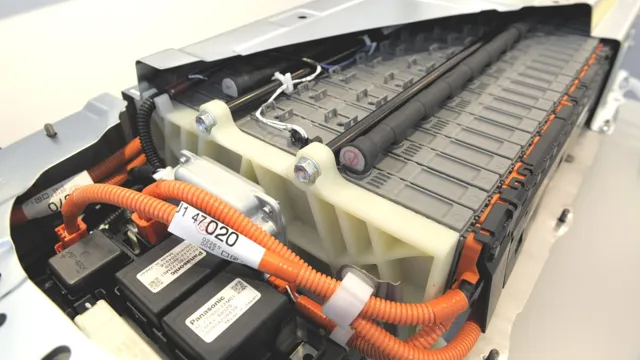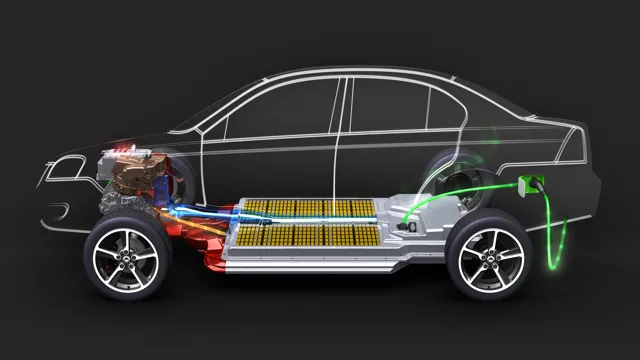Unlocking the Secret to Optimal Electric Car Performance: Understanding the Role of Battery Temperature
Electric cars are quickly becoming a popular mode of transportation, with more and more individuals opting for these eco-friendly vehicles over traditional gas-powered cars. While electric cars offer numerous benefits, such as reduced emissions and lower fuel costs, there is one key factor that cannot be overlooked – battery temperature. Many people may not realize just how crucial it is to maintain proper battery temperature in an electric car.
In this blog post, we’ll explore the importance of electric car battery temperature and why it’s essential to optimize this key feature for optimal vehicle performance. So fasten your seatbelt and let’s get started!
Optimal Battery Temperature for Performance
The temperature of an electric car battery can make a big difference to performance. The optimal battery temperature for performance is generally between 20-30°C (68-86°F). At lower temperatures, the chemical reactions within the battery slow down, reducing the battery’s ability to provide power.
Conversely, at higher temperatures, the battery’s lifespan may be reduced due to increased wear and tear. Maintaining the correct battery temperature is important to ensure the best possible performance from your electric vehicle. Some models have active temperature management systems, which help to regulate the temperature of the battery and ensure it remains within the optimal range.
If you’re considering purchasing an electric vehicle, it’s worth doing some research into the temperature management system of your chosen model, to ensure that it’s able to provide the performance and longevity that you require. Overall, keeping your battery at the optimal temperature is essential to ensuring optimal performance and maximizing its lifespan, helping you to get the most out of your electric vehicle.
Utilizing Temperature Management Systems
When it comes to battery performance, the temperature at which it operates plays a vital role. For optimal battery performance, it’s essential to maintain an ideal temperature range. High temperatures accelerate battery degradation and wear out the battery fast, while low temperatures reduce battery capacity, making it incapable of holding a charge.
Therefore, temperature management systems are critical in maintaining the right temperature for peak battery performance. These systems work by monitoring the battery temperature and adjusting it to the optimal range. When the battery temperature rises, the cooling system turns on, and when it falls, the heating system turns on.
This allows the battery to operate in the ideal temperature range, thus extending its lifespan and performance. By utilizing temperature management systems, you can ensure that your battery runs efficiently, saving you time and money on replacing batteries frequently.

The Impact of Extreme Temperatures
Extreme temperatures can have a significant impact on the performance of batteries. Whether it’s too cold or too hot, both can affect the overall lifespan of the battery. When it comes to optimal battery temperature for performance, it’s crucial to consider the specific type of battery being used.
For example, lithium-ion batteries perform best when maintained at temperatures between 68°F and 77°F. If the temperature goes above or below this range, it can lead to a decrease in battery life and efficiency. On the other hand, lead-acid batteries are more tolerant of extreme temperatures, but they require a much different temperature range for optimal performance.
It’s important to be aware of these factors, especially when using batteries in high-temperature environments. Maintaining the optimal temperature range for your battery will help prolong its life and preserve its efficiency.
Factors Affecting Battery Temperature
When it comes to electric cars, one of the important factors affecting their performance is battery temperature. The temperature of an electric car battery can impact its charging capacity, driving range, and overall lifespan. High temperatures can cause the battery to degrade quickly, while low temperatures can reduce its energy output.
Many factors can influence the battery temperature, including weather conditions, driving style, and charging habits. For instance, extreme heat or cold weather can affect the battery’s performance, leading to reduced efficiency and shorter driving range. Similarly, aggressive acceleration or heavy use of accessories can make the battery temperature rise sharply, affecting its longevity.
To ensure optimal performance and longevity of electric car batteries, it’s essential to be mindful of the many factors that can impact their temperature. Regular maintenance and smart driving habits can help to keep the battery in optimal condition, improving its overall performance and lifespan.
Driving Habits and Conditions
When it comes to the temperature of your car battery, there are several factors that can have an impact. One of the most significant factors is driving habits. If you often take short trips, your battery may not have enough time to fully charge, which could lead to it overheating.
Similarly, if you frequently brake hard or accelerate quickly, this can put a strain on the battery, causing it to heat up. Additionally, extreme temperatures can also affect your battery’s temperature. For example, if you regularly drive in very hot or very cold conditions, this can impact the battery’s ability to operate efficiently.
To ensure your battery stays in good condition, try to drive in a way that is gentle on your car and avoid exposing it to extreme temperatures whenever possible. By doing so, you’ll help extend the life of your battery and avoid unexpected breakdowns on the road.
Charging Practices and Locations
When it comes to charging an electric vehicle, one of the most important considerations is battery temperature. High temperatures can damage the battery, causing it to degrade faster and potentially lose capacity over time. Factors that can affect battery temperature include the charging rate, the state of charge, and the ambient temperature.
Charging at high rates can generate more heat, as can charging when the battery is nearly full. Additionally, hot weather can make it more difficult to keep the battery cool, which is why it’s important to avoid charging in direct sunlight or extremely hot conditions. By being mindful of these factors, EV owners can help ensure the longevity and performance of their vehicle’s battery.
Ambient Temperature and Climate
When it comes to batteries, temperature plays a crucial role in their performance and lifespan. One of the primary factors affecting battery temperature is the ambient temperature or the temperature of the surrounding environment. High temperatures increase the rate of chemical reactions inside the battery, causing it to age faster and reducing its overall lifespan.
On the other hand, extremely low temperatures may reduce the battery’s ability to deliver power, making it less efficient. Climate also affects battery temperature, as regions with extreme weather conditions such as hot and humid summers or cold and dry winters can put additional stress on batteries, leading to premature failure. It’s important to ensure that batteries are stored in cool and dry places to avoid high temperatures that can damage them.
Additionally, choosing the right battery type and size appropriate for the weather conditions of the area can also help optimize battery performance and longevity. In summary, ambient temperature and climate are critical factors to consider when selecting, using, and maintaining batteries to ensure their optimal performance and lifespan.
Tips for Maintaining Battery Health
One of the most important factors to consider when it comes to electric car battery health is the temperature. Extreme temperatures, whether hot or cold, can take a toll on the battery and shorten its lifespan. To maintain your battery health, it is essential to keep it at a moderate temperature range, ideally between 60-80°F.
In hot weather, try to park your car in the shade or set the air conditioning to cool the battery before charging or driving. In cold weather, use a preheating system to warm up the battery while the car is parked. Additionally, avoid fast charging as it can generate excessive heat and damage the battery’s performance.
By following these simple tips, you can help extend the life of your electric car battery and enjoy its full potential.
Regularly Monitor Battery Temperature
As a responsible owner of a battery-powered device, it’s essential to keep an eye on the battery temperature regularly. High temperatures can cause your battery to overheat, reducing its lifespan and causing permanent damage. Similarly, excessively low temperatures can also cause damage to your battery, reducing its charge capacity.
To maintain your battery’s health, keep it at a moderate temperature range, between 20-25°C. You can use a thermal monitoring tool to keep your battery temperature in check and prevent damage. Moreover, avoid exposing your device to direct sunlight or heat sources, such as heaters, to prevent overheating.
Regularly monitoring your battery’s temperature is a simple but crucial step towards maintaining the longevity of your device’s battery.
Avoid Fast Charging When Possible
When it comes to maintaining good battery health, one tip that is often mentioned is to avoid fast charging whenever possible. While it may be tempting to use fast charging as a way to quickly top up your device’s battery, frequent use of this method can actually do more harm than good. Fast charging generates a lot of heat, which can contribute to the degradation of your battery over time.
It’s important to remember that batteries have a finite lifespan, and using fast charging regularly can reduce that lifespan even further. Instead, try to use a slower charging method when possible, and only rely on fast charging when you really need it. By taking care of your battery in this way, you can help ensure that it lasts as long as possible and that your device continues to work well for years to come.
Concluding Thoughts on Electric Car Battery Temperature
In conclusion, it’s clear that electric car battery temperature plays a crucial role in the overall performance of an electric car. Excessively hot or cold temperatures can negatively impact the range and lifespan of the battery, so it’s important to consider ways to regulate this temperature. Some electric cars have built-in cooling systems to combat high temperatures, while others may require external cooling devices.
Additionally, parking in a shaded area or a garage can help keep the battery from overheating on hot days, and preheating the car before driving in cold weather can help maintain optimal battery function. Overall, managing electric car battery temperature is essential for maximizing the performance and longevity of an electric car.
Conclusion
In the world of electric vehicles, battery temperature is no joke. Just like Goldilocks searching for the perfect porridge, batteries too must be kept at the right temperature – not too hot, not too cold, but just right. Because when it comes to driving an electric car, the battery pack is the lifeblood that powers the vehicle.
And if it gets too hot or too cold, it can have a major impact on the performance and overall lifespan of the battery. So, if you want to get the most out of your electric vehicle and keep things running smoothly, make sure to pay attention to your battery’s temperature – it’s the key to unlocking maximum efficiency and performance in the exciting world of EVs.”
FAQs
How does temperature affect the performance of an electric car battery?
Temperature has a significant impact on the efficiency of an electric car battery. Extremely high or low temperatures can reduce the battery’s range and lifespan.
What is the ideal temperature for an electric car battery?
The ideal temperature range for an electric car battery is between 20°C and 30°C. The battery’s performance can decrease by as much as 50% when subjected to extreme temperatures.
Does frequent fast charging affect the temperature of an electric car battery?
Yes, repeated fast charging can cause the battery to heat up, thereby affecting its overall performance. It is advisable to use slow and steady charging methods to maximize the battery’s lifespan.
How can electric car owners ensure the optimal temperature for their batteries?
Owners can take various precautions such as parking in shady areas, pre-cooling or pre-heating the car’s interior before driving, and avoiding excessive use of the battery’s capacity. Additionally, smart charging apps can help manage the battery’s temperature while charging.





